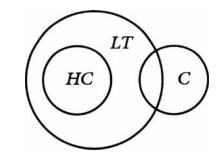12.3: The Logic of Only in Class Logic
- Page ID
- 22036
Consider whether these two sentences are logically equivalent:
Only Americans are Texans.
Only Texans are Americans.
They aren't equivalent. One way to tell is that in the real world one is true and one is false. Logically equivalent sentences are true together or false together. The first sentence is saying, "If you are in the class of Texans, then you are in the class of Americans." The second sentence is saying, "If you are in the class of Americans, then you are in the class of Texans."
Diagrams can be useful for demonstrating the logical relations of sentences containing the tricky word only. Let TX be the set or class of Texans, and let USA be the set of Americans. Then "Only Americans are Texans" has this diagram:
and "Only Texans are Americans" has this diagram:
Now it is clear that the two sentences are not saying the same thing and so are not logically equivalent. If they said the same thing, they’d have the same diagram.
Would it be OK to say only Europeans are Greek? Hmm. We will come back to this question in a moment.
Use the Venn-Euler diagram technique to show the validity or invalidity of the following argument:
Only living things have children.
A computer does not have children.
So, a computer is not a living thing.
- Answer
-
The argument is invalid because in the following diagram the premises come out true but the conclusion doesn't:

HC = the class of things that have children
LT = the living things
C = computers
To abstract from these examples, the main points about the logic of the word only are that the class logic statement
Only A's are B’s
is logically equivalent to the class logic statement
All B's are A's.
Both of those statements are equivalent to the conditional statement
If anything is a B, then it's an A.
Create a counterexample to the following argument by producing a logically analogous argument that is more obviously invalid:
Only Simbidians are Greek. So, only Greeks are Simbidians.
- Answer
-
Consider the situation in which a "Simbidian" is a European. In this situation, the argument has a true premise and a false conclusion. I made up the word Simbidian; you won't find it in the dictionary.
Now let's examine some complicated arguments that depend crucially on the word only. Is the following argument deductively valid?
Only living things can have feelings.
A computer is not a living thing.
So, a computer cannot have feelings.
Also, is the following argument valid?
Only living things can have feelings.
A computer does not have feelings.
So, a computer is not a living thing.
Both of these arguments appear to be valid to many people who hold certain views about artificial intelligence. Yet these people are being illogical.
Are either of the previous two arguments about computers deductively valid?
- Answer
-
The first argument is valid.
Although the Venn-Euler diagram method is very powerful, it has limitations compared to the methods of predicate logic. For example, it cannot represent the information that Fido is either a cat or a dog, nor can it represent relational information such as: If this plant is taller than that plant, then it is also older.


